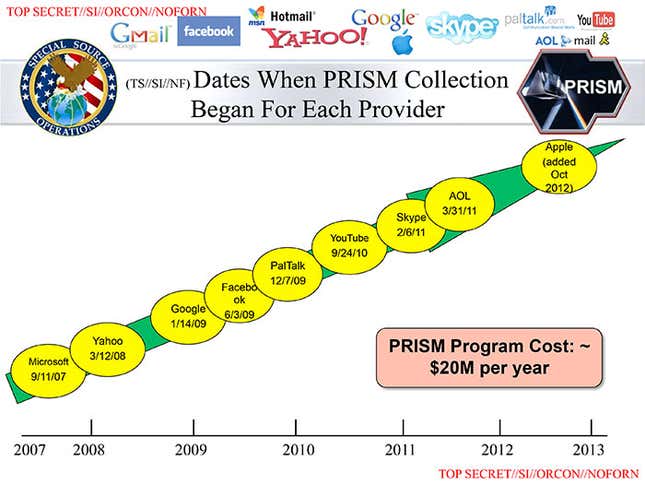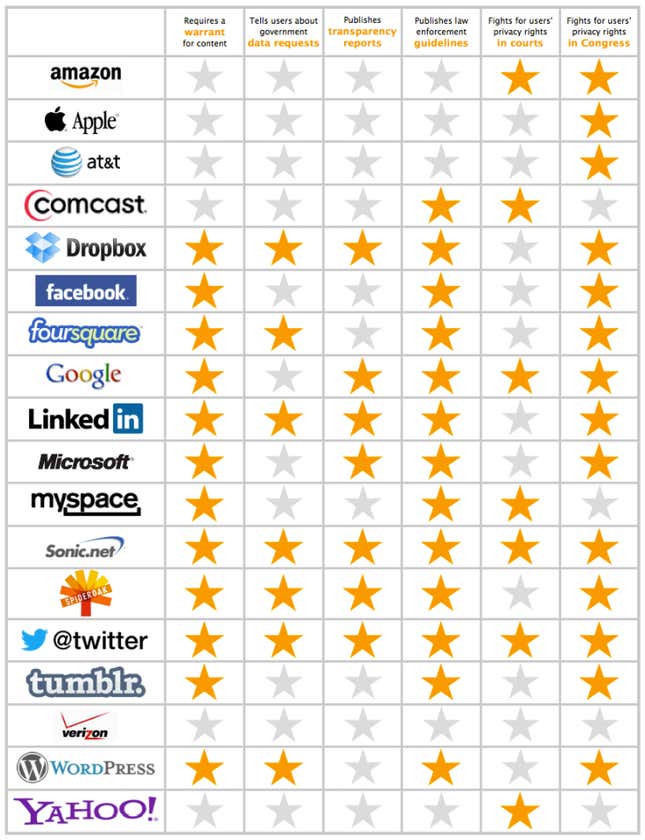
The list of technology companies allegedly participating in a vast US government surveillance program known as PRISM, which was just reported by the Washington Post and Guardian, is notable for one name that’s not on it: Twitter.
The seven-year-old startup is already well-respected for guarding its users’ privacy. It has fought government subpoenas that other companies, like Google, routinely comply with. The Electronic Frontier Foundation, a privacy group, recently gave Twitter six out of six stars for protecting user data from government monitoring.
“No one wants a pen that’s going to rat them out,” Alexander Macgillivray, Twitter’s top lawyer, said last year.

It’s not clear why Twitter isn’t among the nine companies listed on the slides that purport to detail the PRISM program. A spokesman for Twitter didn’t immediately respond to a request for comment. Macgillivray didn’t, either, but after the stories were published, he retweeted another privacy group’s plaudits for Twitter’s data-privacy efforts.
Eight companies are said to be giving the NSA access to user data as part of PRISM: AOL, Apple, Facebook, Google, Microsoft, PalTalk, Skype, and Yahoo. Dropbox was apparently described in an NSA presentation as “coming soon.” Facebook, Apple, Google, Microsoft and Yahoo have all denied flatly that they allowed the government direct access to their servers or even heard of PRISM.
One reason why Twitter might not have been asked to participate in such a program is that it doesn’t have as much private data about its users as, say, Google or Facebook. And it does comply with many government requests for data: 57% of 1,009 such requests in the second half of last year. By contrast, Google complied with 66% of 21,389 user information requests over the same period.
Nevertheless, Twitter’s absence from the PRISM list is likely to earn it praise at the same time that Americans, judging from the early reaction, heap scorn on the technology companies said to be participating in the NSA’s surveillance program.
As people become more familiar with the scope of digital data collection, privacy is an increasingly effective selling point for some companies. Microsoft’s new ad campaign is taglined, “Your privacy is our priority.” That will look hollow if, as the slides assert, Microsoft was the first company to join PRISM, back in September 2007.
The news comes as Twitter is laying the groundwork for an initial public offering that could propel it to a size more like some of the other tech giants. As it seeks to be more profitable, Twitter could feel pressure to play nice with the US and other nations that regularly demand information from technology companies. That’s the challenge facing Macgillivray and other Twitter executives as they navigate the company toward an IPO.
“We value the reputation we have for defending and respecting the user’s voice,” Macgillivray said last year. “We think it’s important to our company and the way users think about whether to use Twitter, as compared to other services.”